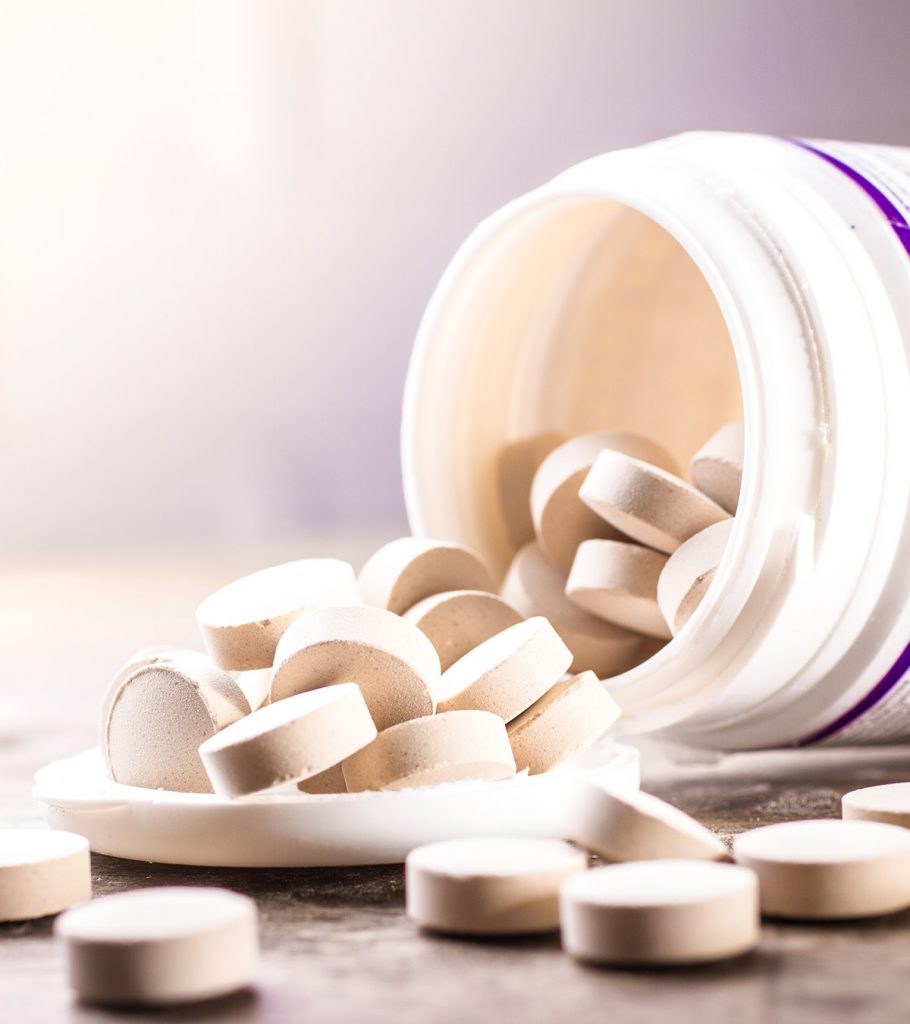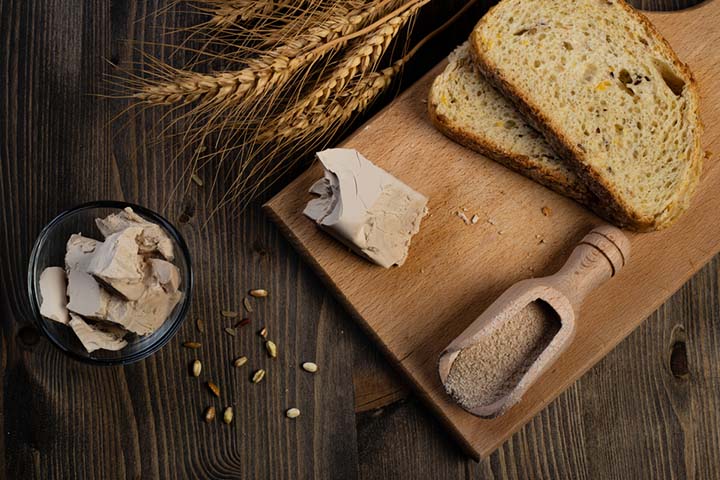Breast milk is the main source of nourishment for babies, and it supplies all the essential nutrients to a baby for healthy growth and development. Hence, besides eating a well-balanced diet, several mothers may consider using brewer’s yeast when breastfeeding.
However, while anecdotal evidence suggests that brewer’s yeast can help improve breast milk production, is its use during lactation safe for the nursing mother and her baby? Continue reading as we tell you more about brewer’s yeast, its safety for babies and breastfeeding mothers, and its possible postpartum health benefits and side effects.
What Is Brewer’s Yeast?
Brewer’s yeast is a fungus made from the one-celled Saccharomyces cerevisiae. It is predominantly used in the brewing of alcoholic beverages, and hence its name. Brewer’s yeast is also used in making bread, although it is different from baker’s yeast. Brewer’s yeast is quite popularly used as a nutritional supplement since 52% of it is protein, and is also an excellent source of B-complex vitamins (1).
Is It Safe To Take Brewer’s Yeast While Breastfeeding?
It is not known if brewer’s yeast is safe when you are breastfeeding since there is insufficient scientific research on it. Medical experts suggest the mothers consult a doctor before having it.
Before deciding to take any galactagogueiXSubstance that helps boost the production of breast milk., you should consider the reasons for doing so. Why do you feel that your breastmilk supply is not adequate? Analyze this and then speak with an IBCLC.
Does Brewer’s Yeast Help Improve Breast Milk Supply?
Probably. Brewer’s yeast has been traditionally used as a breast milk stimulant. Despite its long-standing use as a galactagogue, there is little scientific evidence to suggest that it works. A study found brewer’s yeast efficacy ambiguous, as it was with other galactagogues (2).
While the fungus’ milk-stimulant properties have been anecdotal, lactating mothers can use brewer’s yeast as milk stimulant after doctor consultation. Do keep in mind that the effects of this yeast may vary from person to person.
What Is The Ideal Dosage Of Brewer’s Yeast During Lactation?
Health experts state that one to two tablespoons (15–30 grams) of brewer’s yeast for lactation in the form of powder a day is ideal (3). However, suggested doses may vary, and so, lactating women should consult their healthcare providers before consuming any dietary supplements.
If you do not see any improvement in your breast milk even after several weeks of consumption, then it is best to stop and consult a doctor.
How To Take Brewer’s Yeast When Breastfeeding?
Brewer’s yeast is available in the form of tablets and powder. You can add the recommended quantities of the powder by adding it to preparations like cookies or have it dissolved in water. There is no fixed dosage for brewer’s yeast tablets since the content of the yeast in a tablet varies, depending on the manufacturer. So the dosage can go as high as eight tablets a day.
It is best to stick to the powdered version to ensure you get the correct dosage.
What Are The Health Benefits Of Brewer’s Yeast?
Brewer’s yeast is an excellent source of vitamins and micronutrients, which eventually prevent deficiency diseases. It is also a good source of protein for those who need it in large quantities. Brewer’s yeast is known to improve some conditions like acne (1).
Individuals with diabetes may show better glucose tolerance when provided with a controlled amount of brewer’s yeast daily.
Below are the vital nutrients found in brewer’s yeast (4):
- Protein in the form of 16 types of amino acids
- Chromium
- SeleniumiXEssential micronutrient that helps combat infections and is required for the bodily processes.
- Phosphorus
- All B-complex vitamins
Brewer’s yeast is often considered a nutritional supplement for vitamin B-complex and the micronutrient selenium.
Are There Any Side Effects Of Brewer’s Yeast?
Yes. Some individuals could display an allergic reaction to brewer’s yeast. Symptoms of an allergic reaction include nausea, vomiting, skin hives with intense itching, and abdominal pain. You may also experience side effects such as a headache, bloating of the stomach, and gassiness. Severe allergic reactions can cause anaphylactic shock, where the immune system floods the body with chemicals, causing a shock, an increase in blood pressure, and narrowing air passages (breathing becomes difficult).
Since brewer’s yeast has the potential to cause side effects, you should avoid it in some situations.
When To Avoid Brewer’s Yeast?
You must avoid having brewer’s yeast in the case of:
- History of food allergies: If you develop an allergy to any new food, then you must avoid having brewer’s yeast. Those with allergies towards mushrooms, a type of fungus, should preferably avoid brewer’s yeast since yeast is a fungus too.
- Diabetes: Brewer’s yeast can lead to a sudden drop in blood sugar among diabetics who are on medication. Therefore, do not consume brewer’s yeast without a doctor’s consultation if you have diabetes. However, when consumed in correct dosages as prescribed by the doctor, the yeast can be beneficial for pregnant women with diabetes.
- Having medicines for depression: Do not mix antidepressants with brewer’s yeast, which contains a compound called tyramine. Tyramine can react with monoamine oxidase inhibitors (MAOIs)iXA class of antidepressant medications used to treat psychiatric disorders, such as major depression. and increase blood pressure, thus putting the person at the risk of a heart attack or stroke.
- Inflammatory bowel disease (IBD): Those with inflammatory bowel disease (IBD), especially Crohn’s diseaseiXChronic inflammatory condition of the gastrointestinal tract causing a range of digestive symptoms., should not have yeast as it causes excessive flatulenceiXRelease of gasses of the digestive system from the rectum. and may lead to severe abdominal pain and discomfort.
- Do not mix with other galactagogues: If you are taking other galactagogues, then stop their consumption before having brewer’s yeast. Having multiple galactagogues together may cause a reaction and complicate things.
- Avoid in some cases: If you are prone to excessive flatulence, then you must consult a doctor before having brewer’s yeast. Those with a history of migraine should avoid yeast since a headache is one of its side effects. People with goutiXComplex arthritis characterized by stiff, painful, and swollen joints. should also avoid this yeast since it can cause protein overload. Individuals on antifungal medication and a high protein diet should consult a physician before having brewer’s yeast.
Although a galactagogue and a good source of proteins and B vitamins, considering Brewer’s yeast when breastfeeding could be unsafe. The scientific research on the efficacy of brewer’s yeast is limited, and one cannot be sure how it affects milk production. Keeping this factor in mind, it is necessary to consult a doctor before using brewer’s yeast as a nutritional supplement. Also, women with food allergies, depression, or diabetes should avoid taking brewer’s yeast because of the probability of side effects, such as nausea, vomiting, and anaphylactic shock. Therefore, make an informed decision about its intake and stop using it if you notice any emergency issues.
Key Pointers
- Brewer’s yeast is traditionally taken by breastfeeding mothers as a galactagogue.
- Some experts suggest taking 1-2 tablespoons (15-30 gms) of brewer’s yeast per day.
- There are several vitamins and nutrients (including B vitamins, phosphorus, chromium, selenium, and protein) in brewer’s yeast that makes it a healthy choice.
- Some women may experience adverse reactions after consuming brewer’s yeast, such as nausea, hives, itching, and stomach pain.
- Due to a lack of scientific evidence on its effects on lactation, it is advisable to consult a doctor before consuming brewer’s yeast.















